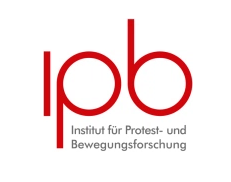
Towards an institute for protest and social movement studies
 In autumn 2015 the German Institute for Protest and Social Movement Studies (ipb) in Berlin organized a networking conference that gathered over 100 social movement researchers for “bridging and bonding” as per the conference title. It was a historical event as it presented the seemingly biggest meeting of social movement and protest researchers in the German speaking world so far, as organiser Simon Teune put it. The event visualized two trends: the request for more collaboration by many social movement researchers and the great initiating potential of the nascent Institute for Protest and Social Movement Studies towards the formation of joint cooperatives and research actions in Germany.
In autumn 2015 the German Institute for Protest and Social Movement Studies (ipb) in Berlin organized a networking conference that gathered over 100 social movement researchers for “bridging and bonding” as per the conference title. It was a historical event as it presented the seemingly biggest meeting of social movement and protest researchers in the German speaking world so far, as organiser Simon Teune put it. The event visualized two trends: the request for more collaboration by many social movement researchers and the great initiating potential of the nascent Institute for Protest and Social Movement Studies towards the formation of joint cooperatives and research actions in Germany.
The ipb was founded as an association by a circle of proactive scientists in Germany in August 2012. One major impetus for the foundation represents the growing dissolution tendencies of institutional academic social movement research. Particularly in Germany, the institutional anchoring of social movement research as well as respective research projects is weak. With the establishment of a space for socio-scientific research on protests and social movements the ipb aims to fill this gap. The driving force of its work is the development of substantial social movement research. According to Melucci´s perception of movements as “disenchanted prophets” the ipb is not only driven by scientific curiosity, but is aware of the evident importance of protests and social movements for democratic systems and the significance to enhance knowledge on them. Thus, the ipb aims at creating a place in which ‘politics from below’ is studied systematically and continuously. Members work towards the quantitative and qualitative development of the discipline, organize protest surveys and initiate new research projects. During the networking conference “bridging and bonding” various working groups were founded that are planning future activities such as meetings and joint publications. Current research projects are on mobilisations in the context of refugee accomodation, local engagement against extreme right-wing movements, deliberative democracy and video surveillance of demonstrations.
As a means to sustainably foster social movement research the ipb functions as an organizational junction, connecting people and ideas, providing networking opportunities and in the long run, working towards a better institutional establishment of social movement research in Germany and beyond. Up to now, the closest institutional partners of the ipb are the Berlin Social Science Center (WZB) and the Center for Technology and Society of the Technische Universität Berlin. Also, the ipb is intensively committed in communication work with the media and other civil society organizations.
Due to its network character the ipb is still (and probably will always be) in the making and aims at expanding its networks, connecting scientists from Germany, Europe and the rest of the world for exchange and joint research. Cooperation is sustained through face-to-face events but also lots of exchange through online collaboration platforms. By now, the ipb has 70 members from all over Germany, Austria and Switzerland. All researchers, who engage with protests and social movements in their research, are invited to join and to co-create the work of the ipb. The coworking is of particular interest for German researchers since a lot of activity is currently taking place in German. Possible coworking areas are: becoming a member and participate in the work of the ipb (self-organization, writing proposals, PR, research), associate with one of the working groups (some working groups also work in English), cowork in the organization of events and participate. In addition, the ipb appreciates all international initiatives for joint events and cooperations!
 Claudia Schütz
Claudia Schütz
I currently work as a project assistant at the Department of Sociology at the University of Innsbruck, Austria, funded by the Tyrolean Research Fund. My research interests include political sociology, protest and social movement research, critical theory and qualitative research methods. I am a member of the Institute of Protest and Movement Research (ipb) in Berlin.





0 Comments